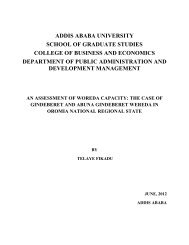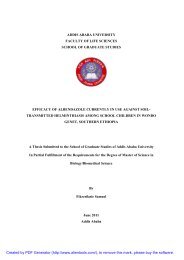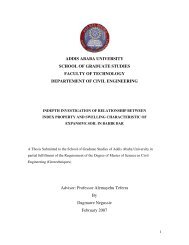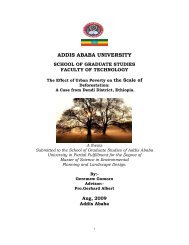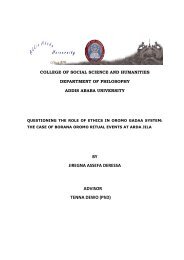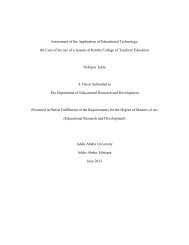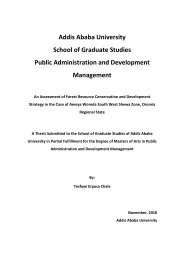FACTORS THAT CONTRIBUTE TO THE PROBLEMS EFL ...
FACTORS THAT CONTRIBUTE TO THE PROBLEMS EFL ...
FACTORS THAT CONTRIBUTE TO THE PROBLEMS EFL ...
Create successful ePaper yourself
Turn your PDF publications into a flip-book with our unique Google optimized e-Paper software.
It is obvious that the native speakers of English live in temperate and cold<br />
zone of the globe. Snow is a common phenomenon in these areas, and skiing and<br />
snowboarding is part of their culture. According to Oxford Advanced Learners’<br />
Dictionary, ‘Skiing’ is a kind of sport or activity of moving over snow on skis.<br />
‘Snowboarding’ is also another kind of sport of moving over snow on a snowboard.<br />
These sports are common in the culture of the native speakers of English,<br />
particularly, in the United States, Canada and the UK. Let us see the following<br />
statements related to cultural factors regarding this issue. Example, “Fred wanted<br />
to go skiing, or he wanted to go snowboarding.” Interpreting these sentences may<br />
be difficult for students who have never ever experienced<br />
snow/skiing/snowboarding in their life time. Thus, issues about ‘skiing’ or<br />
‘snowboarding’ or ‘snow’ may be misunderstood by foreign listeners who didn’t<br />
have prior exposure. Underwood (1989:19) states, “Students who are unfamiliar with<br />
the cultural context may have considerable difficulty in interpreting the words they hear<br />
even if they can understand their ‘surface’ meaning.”<br />
According to Brown (1994), culture includes the sociolinguistic aspects of<br />
language which deal with politeness, formality, metaphor, register, and other<br />
culturally related aspects of language as dialects and figures of speech. He adds<br />
that if the L2 learners are not familiar with the sociolinguistic aspects of the<br />
language, they may misunderstand intended meanings of utterances within the<br />
contexts.<br />
c) Familiarity with natural feature of spoken English<br />
The spoken features of native speaker English can be difficult for <strong>EFL</strong><br />
learners who do not have previous exposure. Regarding this Ur (1984) describes<br />
that non-native learners who are unfamiliar with authentic features will have<br />
difficulty in perceiving aspects of listening such as hearing the sounds,<br />
understanding intonation and stress, and redundancy under colloquial vocabulary<br />
and understanding different accents.<br />
It is apparent that the beginning task of L2 listener is, first of all, to perceive<br />
and to break out the important sounds from the ongoing stream, and to<br />
differentiate units. In this process the students may face problems. Underwood<br />
(1989) says the problems the students face may be partly due to the strange<br />
23




